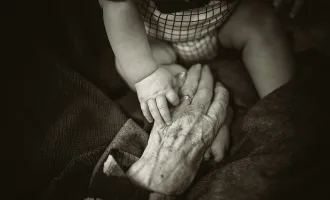Social Histories: Physicians share stories of mortality in medicine
“Can stories teach us how to let go?” Dr. Joseph Pace queried the standing-room-only audience at “Social Histories,” an event bringing together physician–storytellers from around the Bay Area to contemplate the nature of mortality in medicine.
Each of the six speakers at the Faculty Alumni House on the evening of Nov. 10 offered a reflection on mortality and illustrated it through a patient story, anonymized to protect confidentiality. Inspired by Atul Gawande’s recent book “Being Mortal” and sponsored by Primary Care Leadership Academy and Primary Care Progress, the event made a powerful case for the role of the narrative in medicine.
In his book, Gawande asserts that, “our most cruel failure in how we treat the sick and the aged is the failure to recognize that they have priorities beyond merely being safe and living longer; that the chance to shape one’s story is essential to sustaining meaning in life.”
Kevin Grumbach, chair of the Family and Community Medicine Department at UCSF, echoed this sentiment by sharing his experience with an 86-year-old Cambodian patient. Though her health had been declining and she had signed Do Not Resuscitate/Do Not Intubate orders, she nevertheless ended up on a ventilator in the ICU.
Grumbach exhorted clinicians and trainees in the audience to strive to “hear the poem in every patient” and to know when prolonging life is no longer a desirable aim. He noted that seeing patients through their final weeks, days and hours is “the most honorable part of being a doctor.”
Dr. Hali Hammer, director of primary care for the SF Health Network, explored mortality from the viewpoint of a family doctor, intimately intertwined in the lives of her patients. One particular family and their cycles of successes and struggles played “a huge starring role in my understanding of what it means to be a family doctor,” said Hammer. She shared the poignant tale about bearing witness to a devastating late-term pregnancy loss and the subsequent birth and “blessing” of a healthy baby boy.
Reflecting on the human aspect of the word mortality, Dr. Carol Miller, medical director of the Well Newborn Nursery at UCSF, injected some levity by quoting a patient: “I am not a cow.”
Miller recalled having reached an impasse in counseling a new mother on the merits of breastfeeding. She was incredulous when, decades later, the same patient sternly advised her own daughter to breastfeed her newborn child. Sometimes, quipped Miller, “it takes more than one generation to get your point across.”
In “Being Mortal,” Gawande says, “I learned a lot of things in medical school. Mortality wasn’t one of them.” The Social Histories event was a step toward addressing this shortcoming, giving UCSF clinicians and trainees alike the chance to wrestle with the inevitability of mortality through human stories.


